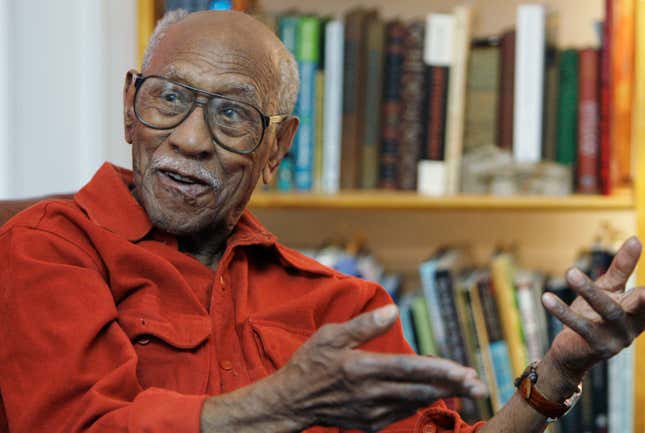
Timuel Black, an educator, political adviser, historian and activist has died at age 102, taking with him a wealth of wisdom and leaving behind a legacy of change.
Black, who was a pioneer in civil rights and coined the phrase “plantation politics,” passed away on Wednesday, the Chicago Sun-Times reports.
Black’s story began as the youngest of three children to sharecropper parents. He migrated with his family from Alabama to Chicago in 1919 and began his work in activism as a teenager during the Great Depression. In 1931, Black walked his first picket line as a store clerk protesting for better wages with his coworkers.
On his 23rd birthday, Pearl Harbor was bombed and Black enlisted to fight in World War II.
He often looked back on his experiences of overt racism during his two years of service. “I was angry. I made an emotional decision that, when I returned from the Army, that most of the rest of my life would be spent trying to make where I live and the bigger world a place where all people could have peace and justice,” Black said in an interview with the University of Chicago in 2014, according to the Sun-Times.
When Black came back home, he held true to that promise. He began working as a social worker, high school teacher and organizer fighting segregation and discrimination within the school system. The Sun-Times also notes that he helped establish the Teachers Committee for Quality Education and was well known for his activism both in and out of the classroom. Over the next six decades, Black would go on to become a prominent figure in both the civil rights and political justice movements.
Black helped establish the Congress of Racial Equality and the United Packinghouse Workers of America. He worked with activists Paul Robeson, W.E.B. DuBois, Rev. Jesse Jackson and Martin Luther King Jr., who would become a close confidante. Black also organized and led 2,000 Chicagoans during the historic March on Washington where King delivered his famous “I Have A Dream Speech.”
“I had to carry that dream in my mind and in my heart,” Black said according to ABC 7 Chicago. “I had an obligation to this man who articulated for me, and for many more, the dream of how the world ought to be.”
On Jan. 15, 2019, what would have been King’s 90th birthday, Black released his memoir, Sacred Ground: The Chicago Streets of Timuel Black.
Black was unsuccessful with getting into public office himself, but he was instrumental in getting Harold Washington elected as the first African American mayor of Chicago, according to ABC 7. Black was an adviser for many of Chicago’s Black elected officials, including Carol Moseley Braun, who was elected as the first African-American woman in the U.S. Senate in 1992.
He also advised former U.S. President Barack Obama, who sought Black out in 1991 when he wanted to get involved in activism. When the former president heard of Black’s passing on Wednesday, he called the civil rights giant an “icon.”
Black recently joined the University of Chicago-led Community Advisory Board, working to bring the Barack Obama Presidential Library to Jackson Park. He remained active in progressive politics well into his late 90s, ABC 7 notes.
In 2018, Black was listed as one of 200 of the most prominent Illinoisans in history by the Chicago Sun-Times. When he turned 100, the University of Chicago honored him with a Symposium and the next day the “100 Years: Music and Memories, Tim Black’s Bestest Birthday Party” was held at the South Shore Cultural Center.
“I suppose, when you live to 100, it’s worth celebrating,” Black said then, according to the Sun-Times.
He is survived by his wife, Zenobia Johnson-Black, and daughter, Ermetra Black, who was born during his first marriage. His two sons, Timuel and Anthony, both passed away at a young age.
“My husband would say, just do your best to help this world be a better place,” Black’s wife told ABC 7.